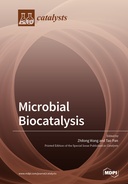Explore

Microbial Biocatalysis
Zhilong Wang (editor) and Tao Pan (editor)
2023
0 Ungluers have
Faved this Work
Login to Fave
Biocatalysis is a sustainable alternative for the chemical industry in manufacturing, monitoring, and waste management. Biocatalytic processes perform with isolated enzymes or whole cells as biocatalysts. Whole-cell biocatalysts offer some unique advantages of cascade reactions catalyzed by multienzymes as well as a single bioredox reaction with cofactor regeneration in a single strain. Therefore, whole-cell biocatalysts are widely applied for biosynthesis/biotransformation to produce value-added chemicals as well as the complete mineralization of organic pollutants.Biological catalytic processing using whole-cell biocatalysts includes biocatalyst engineering, bio-reaction engineering, and downstream processing. In addition to the traditional screening of microbial strains and immobilized whole-cell biocatalysts, modern genetic engineering, metabolic engineering, and synthetic biology make tailored whole-cell biocatalysts possible. At the same time, some integrated processes have successfully been applied in the catalytic processing using living whole-cell biocatalysts, such as harnessing biocompatible chemistry to interface with the microbial metabolism as well as using various separation techniques for in situ product removal.This reprint on “Microbial Biocatalysis” provides a comprehensive overview of the recent developments of catalyst discovery, catalyst modification, and process intensification for whole cell catalysis in fermentation, biotransformation or biodegradation processes.
This book is included in DOAB.
Why read this book? Have your say.
You must be logged in to comment.
Rights Information
Are you the author or publisher of this work? If so, you can claim it as yours by registering as an Unglue.it rights holder.Downloads
This work has been downloaded 52 times via unglue.it ebook links.
- 52 - pdf (CC BY) at Unglue.it.
Keywords
- (R)-1-phenylethanol
- Absidia coerulea
- acetophenone tolerance
- aerobic composting
- Arthrobacter sp. ST11
- atrazine
- Biochemical engineering
- Biodegradation
- biopolymers
- Biotechnology
- biotransformation
- C058
- C7-hydroxylation
- Cadmium
- cell immobilization
- culture conditions optimization
- Cunninghamella blakesleeana 3.970
- depolymerization
- DHEA
- diclofenac
- directed evolution
- Enzymes
- Extracellular Polymeric Substances
- Gibberella sp.
- glycerol
- immobilization
- laccase
- Marine enzymes
- metabolites
- microbial transformation
- microcosmic structure
- microflora composition
- multifunctional enzymes
- mycelium biofloc
- n/a
- nicotinic acid
- nitrilase
- nonaqueous-phase liquid
- nysfungin
- nystatin A1
- nystatin A3
- O-demethylation rabeprazole sulfide
- p-coumaric acid
- Persian Gulf
- phase inversion
- phenol
- phenylalanine ammonia-lyase
- phytosterols
- Pickering emulsion
- plant oil
- polyfungin B
- post-modifying enzymes
- rabeprazole
- rapeseed oil
- reaction optimization
- secondary metabolic
- semi-continuous packed-bed bioreactor
- Sewage treatment
- short-chain dehydrogenase/reductase
- starch hydrolysis
- Streptomyces noursei
- sulfide
- sustainability
- synthases
- Technology, engineering, agriculture
- Technology: general issues
- Toxicity
- trans-cinnamic acid
- UV mutagenesis
- whole genome sequencing
- whole-cell biotransformation
- whole-cell catalyst
- xenobiotics
- Yarrowia lipolytica
- α-amylase
- α-ketoglutaric acid biosynthesis
Links
DOI: 10.3390/books978-3-0365-7190-4Editions

